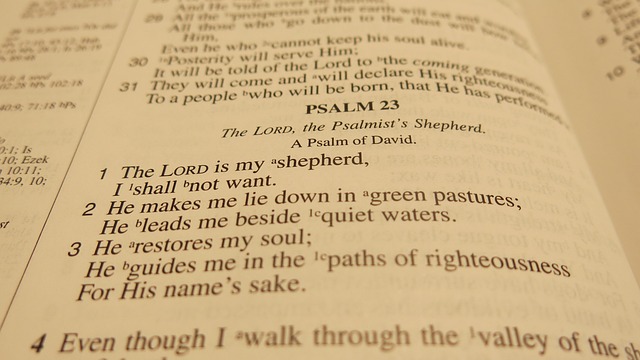
themes of the Psalms

Image by G Johansen from Pixabay
Have you ever wanted to go deeper in your relationship with God specifically by studying the Psalms? Are you longing for a better understanding of God and how He relates to human beings? On this page, which covers themes of the Psalms, you'll find an outline of several important points regarding the message of what is a poetic song book.
The Psalms offer a profound look into the interaction between humans and the divine, inviting us to explore themes that encourage us in the daily Christian walk.
Studying the Psalms and its various themes can :
- Deepen your relationship with God,
- Enhance your worship,
- Provide moral and spiritual guidance,
- Help guide you in the path of emotional healing,
- Connect you to the broader Christian tradition,
- Help and encourage you when it comes to relating to God emotionally as the human Psalmists did
- Motivate you to actively live out your faith.
It's important to note that because of the poetic genre of the Psalms, we shouldn't approach the Psalms as a theological treatise or instruction manual. Consider the harsh language in some of the Psalms used by the author (s) in reference to his enemies. For further study regarding the genre of the Psalms, I highly recommend books by Tremper Longman III and also Psalms Old and New: Exegesis, Intertextuality, and Hermeneutics by Ben Witherington III.
The following list of themes and descriptions in relation to the Psalms is a good starting place in terms of studying this wonderful Book of musical poetry in the Bible.
As you read through the Psalms, keep the following encouraging themes in mind:
1. God's Available Presence to Us: the Psalms highlight that God is always with us—offering refuge, understanding our lives, comforting us in distress, guiding us, and inviting us to seek Him.
2. God's Character: The Psalms highlight God's unwavering love and faithfulness, portraying Him as compassionate, trustworthy, and eternally reliable. His love provides protection, and His faithfulness ensures that He keeps His promises across all generations.
3, God's Word (precepts, commands, etc.): The Psalms emphasize that God's Word is a source of guidance, joy, wisdom, protection, and strength. His Word is eternal and unchanging, and believers are called to meditate on it and live according to its precepts.
4. Revering God: The Psalms emphasize reverence for God through worship, awe, holiness, praise, submission to His will, and acknowledgment of His sovereignty. This reverence is foundational to wisdom and a right relationship with God.
5. Praise, Worship, and Thanksgiving: The Psalms emphasize that praise, worship, and thanksgiving should be continual and joyful. While one can worship God alone in that quiet space, such an act should also be communal. Numerous verses in the Psalms highlight the importance of acknowledging God's deeds, His holiness, as well as His enduring love and faithfulness. Worship is a response to God's greatness and an integral part of a believer’s life.
6. Seeking God when Grieving: The Psalms provide a profound resource for those grieving, emphasizing that God is close to the brokenhearted, a refuge in times of trouble, and a healer of wounds. They encourage crying out to God, seeking His presence, and finding comfort in His Word and promises, offering both the validation of sorrow and the hope of divine comfort and restoration.
7. Trusting in God: Trust and Confidence in God: Many Psalms emphasize trust in God's protection, faithfulness, and righteousness, even in difficult times. They affirm belief in God's sovereignty and justice (e.g., Psalm 23, Psalm 27, Psalm 91).
8. Repentance and Forgiveness: These Psalms express sorrow for sin, seek God's forgiveness, and reflect on God's mercy and the joy of being restored to a right relationship with Him (e.g., Psalm 32, Psalm 51).
9. Remembering God's Acts: Some Psalms recount Israel's history, highlighting God's faithfulness and mighty deeds, and serve as reminders of God's covenant with His people (e.g., Psalm 78, Psalm 105, Psalm 106).
10. Kingship and Messianic Prophecy: Some Psalms focus on God's rule and the coming of a future king or Messiah who will establish God's kingdom on earth. These Psalms often have dual references to contemporary kings and the anticipated Messiah (e.g., Psalm 2, Psalm 72, Psalm 110).
11. Lament and Suffering: A significant number of Psalms express sorrow, grief, and pleading for God's intervention in times of trouble. These Psalms often include cries for help, expressions of deep pain, and questions about suffering (e.g., Psalm 13, Psalm 22, Psalm 42).
12. Wisdom and Instruction: Reflecting on themes similar to those found in the Book of Proverbs, certain Psalms provide moral and spiritual guidance, offering insights on righteous living and the consequences of wickedness (e.g., Psalm 1, Psalm 37, Psalm 119).
I hope this helps as a starting point for further exploration of such an extensive Book as the Psalms.